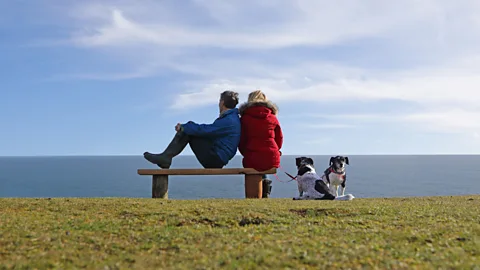Pet-sitting: A unique way to travel the world for free
 Getty Images
Getty ImagesRising travel costs have more people looking to book free stays via home- and pet-sitting sites.
Travelling can be expensive, and a combination of high inflation and a global post-pandemic travel boom has caused costs from flights and hotel stays to soar over the last few years. But as prices rise, globetrotters are finding inventive ways to save. No, not by visiting destination dupes, or couch-surfing, tactics that have been around for over a decade now. But via house- and pet-sitting exchanges, which have been on the rise.
In these exchanges, a visitor cares for someone else's home by doing basic tasks such as watering plants and bringing in the mail – as well as, typically, taking care of the homeowners' pets. They're designed to be mutually beneficial to both those who need their home and animals looked after, as well as those seeking a budget-friendly stay in a certain location.
According to Angela Laws, head of community and public relations for the house- and pet-sitting site TrustedHousesitters (THS), the trend is booming, with UK house- and pet-sits rising by 55% last year. In the US, there was a dramatic 69% rise, she says. It makes sense: Airbnbs have gotten more expensive and hotels seem to keep tacking on extra fees. Plus, many homeowners are struggling to make ends meet without throwing in the cost of taking trips.
For me, I've been house- and pet-sitting for a little over a year and I've found it to be well worth the few extra steps (and dog walks).
 Getty Images
Getty ImagesI'm far from the most low-maintenance traveller out there. I love a cosy bed and luxe amenities – when I can afford them. Still, I've had success staying in other people's homes around the United States, walking their dogs or snuggling their cats, to save on travel costs. Last year, I took a solo weekend trip to a New Jersey beach town. I strolled the Asbury Park boardwalk, shopped and even went on a date. Just last month I took my daughter to Brooklyn, New York, where we snuggled an old pup and hit the big city for a comedy show.
I'm hoping to book my third trip – to the mountain town of Asheville, North Carolina – this week (as long as the homeowners pick me after we FaceTime). I have bigger bucket-list plans, though. I'm hoping to visit Hawaii in the next year or two and eventually, take my kids to Italy.
For me, using a house- and pet-sitting site is a solid financial win because I can get out of town without cutting too deeply into my (limited) single-parent budget. While travel is never completely free – you still have to get there, eat and keep yourself entertained – not having to pay a penny for a hotel or an Airbnb is hugely helpful.
There are plenty of sites where you can sign up for a yearly membership with varying prices. For instance, MindMyHouse is $29 per year (£23), House Carers is $50 (£39) and THS is $129 per year (£102.25). While all sitting sites charge a membership for prospective sitters, some are free for homeowners. But the costs are small, considering you could book multiple trips each year for roughly the cost of one night in a budget hotel. THS is also notable because, unlike on other sites, it doesn't allow homeowners to charge security deposits or other fees.
Signing up is as simple as making a profile that showcases your house- and pet-sitting experience, and why you would make a great fit. Then, you can start shopping for destinations that align with your availability.
 Getty Images
Getty ImagesSo far, I've only looked after animals and homes that are a few hours from where I live so that I wouldn't have to pay for airfare. According to Laws, 72% of arrangements are domestic like mine; however, plenty of travellers use house- and pet-sitting exchanges when travelling far and wide.
Sharyn Nilsen, who is from Australia and is based in Vietnam for much of the year, has been travelling full-time with her husband, Tim, for the past 18 years. She says house- and pet-sitting "enhances our adventures and keeps us on a budget".
The Nilsens have explored more than 140 countries and territories thanks to this unique lodging approach. "Last year, we sat in Mumbai, London, Paris, Brussels, Zurich, Lausanne, Oxford, Rye and Ho Chi Minh City," Nilsen says. "I added it up the other day: in the past seven years, we've sat for 770 nights. And remember, there were two years out because of Covid."
The lifestyle works so well for the Nilsens that they no longer have a place of their own in Vietnam. Instead, they rent a fully furnished home when they go back to visit. House-sitting, Nilsen says, "is so sustainable" that it just makes sense to keep doing it. The Nilsens now help others embark on the same journey with their website, fittingly called Catch Our Travel Bug, which is filled with tips on how to make a stand-out house-sitting profile.
"I've helped loads of newbies venture into this amazing lifestyle," Nilsen says. Still, she warns that house- and pet-sitting isn't just a free vacation – it comes with real responsibilities that vary from sit to sit. That can mean walking dogs, feeding chickens or even caring for horses or reptiles. Tasks such as administering pet medications are part of many stays, too. If travellers aren't prepared for those responsibilities, she recommends they don't travel this way. And there are other potential drawbacks to the pet-sit requirement in general: travellers who prefer long nights out on the town or day trips away from a home base may feel that being tied to pet duties isn't worth it.
Another concern with house- and pet-sitting (that's more troublesome than pet hair) is what has, in rare circumstances, happened to travellers attempting to cross borders. While house- and pet-sitting is broadly not regarded as work, on occasion, border control has denied travellers entry to countries for not having a work permit. TrustedHousesitters has letters on the site that travellers can print to give to border agents. "Our traveller members, in subscribing to our site, are purposefully seeking a more cost-efficient manner of vacationing, and NOT to seek a 'job', to take away an employment opportunity from an American/Permanent Resident, or to otherwise provide a service for payment in the United States," the letters state.
New York-based immigration attorney Afia Yunus says that in these instances in the US, border control is misinterpreting the law. She says that if a homeowner is not requiring work and compensating for that work, "it cannot be construed as unauthorised employment under the Immigration Nationality Act" in the United States. She continues, "They're not getting paid. They're entering on a valid tourist visa. There's zero issue."
"I would advise the tourist who is entering the US needs to be careful about using the word 'sitting' because that implies that there is some type of compensation," Yunus explains. "That's one of the markers of whether it's considered employment." Outside of the US, Yunus says that other countries may handle the scenario differently. THS also advises travellers to do their research on each country they plan to enter to find out their specific requirements. "We would advise that you check any relevant travel bureaus and authorities, as you would when arranging any other trips abroad," the website states.
Still, despite doing some due diligence, for Nilsen, there is no other way to travel. It's not about taking a quick holiday (or many). It's a way of life that's about exploring and immersing herself in the culture of the locations she finds herself in. She imagines she and her husband will reach 160 countries – "maybe 170", she says, within the next five years.
Laws also believes that travelling this way is something special. She says it fosters connections that "are authentic and unique" – and not just with the animals, but with the people who are sharing their spaces and their pets. It's no small ask, but it's a two-way street. And, as far as house- and pet-sitting goes, trust seems to beget trust.
EDITOR'S NOTE: A previous version of this story did not account for possible issues resulting from not having the proper immigration requirements to house- and pet-sit internationally. We have amended the text accordingly.
--
For the best of BBC.com in your inbox every Friday, sign up to The Essential List newsletter for a handpicked selection of features, videos and can't-miss news.
